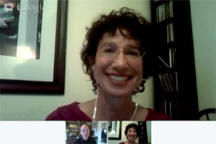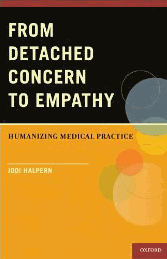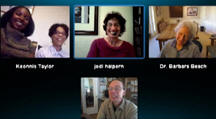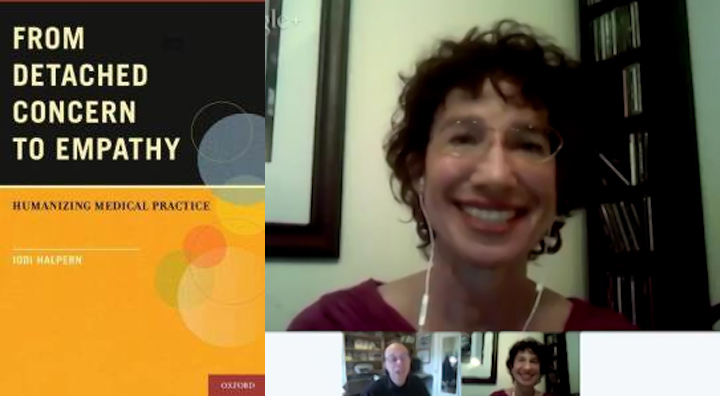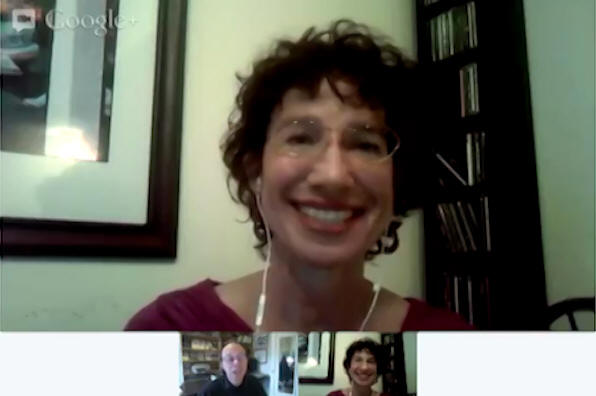|
|
|
Culture of Empathy Builder:
Jodi Halpern
Jodi Halpern and Edwin Rutsch: How to Build a Culture of Empathy
in Healthcare
Jodi Halpern M.D., Ph.D, is Associate Professor of
Bioethics and Medical Humanities at the University of California, Berkeley,
in the Joint Medical Program and the School of Public Health. As a
psychiatrist with a background in philosophy, she investigates how emotions
and the imagination shape healthcare decisions of clinicians and patients. She is author of
From Detached Concern to Empathy: Humanizing Medical Practice.
Clinical Empathy: "As a psychiatrist as well as
a faculty member in bioethics at UC Berkeley for almost two decades, I’ve
investigated what happens to patients when their doctors show a lack of
empathy. Doctors were trained to believe that emotional detachment from
patients is personally and professionally necessary, but experience shows
that patients don’t trust doctors who are aloof or superficially friendly.
Yet, only recently have studies proven just how harmful detachment and how
beneficial empathy is for healing...."
Links
Jodi
Halpern M.D., Ph.D, is Associate Professor of
Bioethics and Medical Humanities at the University of California,
Berkeley, in the Joint Medical Program and the School of Public Health.
She is author of
From Detached Concern to Empathy: Humanizing Medical Practice.
Jodi Halpern: How to Build a Culture of Empathy in Healthcare
This is part one
of a chapter by chapter review of the Jodi's book & An Overview of the Book Chapter 1: Failures of Emotional Communication in Medical Practice
Overview of Book Chapter 2: Managing Emotions as a Professional Ideal
Jodi Halpern: How to Build a Culture of Empathy in Healthcare (Part 2) From Detached Concern to Empathy: Humanizing Medical Practice (Chapter 3)
From Detached Concern to Empathy: Humanizing Medical Practice. (considers emotional reasoning, moods, and the nature of emotions.)
"This chapter explores the subjectivity of emotional judgments. A major
thesis of this book is that by critically using these subjective sources
of information physicians will take fuller histories and engage in more
effective communication.... This Chapter has argued the the very
properties of emotional reasoning that traditionally have been equated
with irrationality can be harnessed in service of medical care if
physicians can develop self-awareness. The most important use of
emotional reasoning is for the practice of clinical empathy."
Jodi Halpern: How to Build a Culture of Empathy in
Healthcare (Part 3)
Chapter 4: The Concept of Clinical Empathy
Clinical empathy as detached Insight
Aesthetics and origins of the concept of Empathy
Psychoanalytic View of Empathy as Affective Merging
A
model of Clinical empathy as emotional reasoning
Summary: By contributing to diagnosis, patient autonomy, and
therapeutic influences, empathy leads to more effective and not just
more pleasing, medical care.
We're in the process of doing the interviews and reviews of
Chapters 5 to 6. Stay Tuned.
Chapter 5: Respecting Patient Autonomy:
From Non-Interference to Empathy
1. Respecting
Autonomy: Beyond Non-Interference
2.
Beyond
Negative
Autonomy - Kant on
Deliberative Freedom
3. Autonomy versus
Detachment
4. Suffering, Empathy, and the Interpersonal Basis of Autonomy
5. Kantian Theory and Positive Obligation to Share Ends
6. The
Complex Relationship between Empathy and Respecting Autonomy
Chapter 6: Cultivating Empathy in Medical Practice
From Certainty to Creativity Emotional Irrationality Revisited: Finding the Therapeutic Opportunity
Regaining mental Freedom
Non-Abandonment
Don't Blame Empathy
"In a recent New Yorker piece, Paul Bloom argues that empathy is the
wrong stance for public morality, as in promoting public health,
because it focuses our attention on the individuals we readily
empathize with -- such as the baby stuck in a well -- and blinds us to
the unmet needs of the many whose problems are harder to imagine. Mr.
Bloom makes a number of valid points. But, as Michael Zakaras points
out, Bloom seems to miss the cognitive aspects of empathy, and thus
misses the crucial role that empathy must play in ethical decisions.
Zakaras, though, goes too far in defending empathy as the basis of a
coherent moral vision. Both authors ignore the bigger problem we face
in policy decisions, which is that we seem to lack a capacity to bring
our distinct moral perspectives -- empathy, justice, efficiency --
into one coherent view. This is a limitation of reason, not of
empathy."
2003 Aug
-What is Clinical Empathy? Journal of General Internal Medicine:
From Detached Concern to Empathy: Humanizing Medical
Practice - Philip Berry
From Detached Concern to Empathy: Humanizing Medical
Practice (review)
Journal
of
Med Ethics
Empathy is not a medical frill but a necessity
==========================================================================
Other Questions and Topics to explore
Book on Self-Empathy Empathy - Compassion Definitions and Relationships
the feel of it What about Mirror Neurons? What does a culture of empathy look like
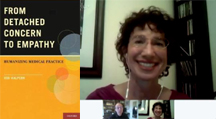
|
|||||||||||||||||||||||||||||||||
|
||||






